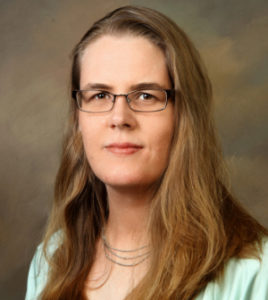Dr. Amy Wiles
Associate Professor of Biology
Education
- B.S. Biology, Mississippi College
- Ph.D. Biochemistry and Cellular and Molecular Biology, The University of Tennessee, Knoxville
- Postdoctoral Fellow (focus on Systems Biology) at the Greehey Children’s Cancer Research Institute at The University of Texas Health Science Center at San Antonio
Courses Taught
- Introduction to Biology II (BIO 212)
- Genetics (BIO 310)
- Bioinformatics (BIO 415)
- Eukaryotic Cell Biology (BIO 460)
- Biochemistry I (BMB 465)
- Among Gods and Heroes (GBK 101)
Specialty
Genetics, Molecular Biology, Comparative Systems Biology, Bioinformatics
Research Interest
Dr. Wiles approaches comparative biology utilizing both “classical” and computational genomics and proteomics, specifically protein-protein interaction (PPI) networks (interactomes). The union of comparative genomics and bioinformatics provide powerful and informative tools to the research scientist: some model organisms are better suited to a particular line of research or experiment type, and applying knowledge across species can fill in knowledge gaps while allowing for focused experiments. This has a tremendous impact on basic science research applications in that what scientists study at the bench can be translated to directly improve human health.
Dr. Wiles’ primary research goal is to understand how cells respond to nutrient stimuli by elucidating novel pathways involved in nutrient response and characterizes functional analogs and new genes related to nutrient biology. From growth and development, to the end of the life of a cell, response to its environment is critical. Upon aberrant response to a stimulus, the operations of the cell may go awry, resulting in the development of disease. Misregulated sulfur metabolism, for instance, has a direct effect on liver function, while defects in nitrogen metabolism may affect amino acid synthesis and turnover. Dr. Wiles uses the yeast Saccharomyces cerevisiae in molecular biology investigations, while conducting comparative genomics and proteomics in silico across multiple species. There are opportunities for students, both at the bench and at the computer, to be involved in active research in her lab.
Recent Publications
- “Building and analyzing protein interactome networks by cross-species comparisons.” Wiles A.M., Doderer M., Ruan J., Gu T-T, Ravi D., Blackman B., Bishop A.J.R. (BMC Syst Biol 2010; 4:36)
- “A network of conserved DNA damage survival pathways revealed by a genomic RNAi screen.” Ravi D., Wiles A.M., Bhavani S., Ruan J., Leder P., Bishop A.J.R. (PLoS Genetics 2009; 5:6)
- “An analysis of normalization methods for Drosophila RNAi genomic screens and development of a robust validation scheme.” Wiles A.M., Ravi D., Bhavani S., Bishop A.J.R. (J Biomol Screen 2008; 13:777-784)
- “The intertwining of DNA damage response pathway components and homologous recombination repair.” Brown A.D., Karia B., Wiles A.M., Bishop A.J.R. (Genetic Recombination Research Progress 2008; 1-68)
- “Nutrient regulation of the Oligopeptide Transport family in Saccharomyces cerevisiae.” Wiles A.M., Cai H., Naider F., Becker J.M. (Microbiology, 2006; 152:3133-3145)
- “Transmembrane domain prediction and consensus sequence identification of the Oligopeptide Transport family.” Wiles A.M., Naider F., Becker J.M. (Res Microbiol 2006; 157:395-406)
- “An oligopeptide transporter gene family in Arabidopsis.” Koh S., Wiles A.M., Sharp J.S., Naider F.R., Becker J.M., Stacey G. (Plant Physiology 2002; 128:21-29)
- “Enkephalins are transported by a novel eukaryotic peptide uptake system.” Hauser M., Donhardt A.M., Barnes D., Naider F., Becker J.M. (J Biol Chem 2002; 275: 3037-3041)
- “Multiplicity and regulation of genes encoding peptide transporters in Saccharomyces cerevisiae.” Hauser M., Narita V., Donhardt A.M., Naider F., Becker J.M. (Mol Membr Biol 2001; 18:105-112)
Contact Dr. Amy Wiles
(478) 301-2765
wiles_am@mercer.edu
